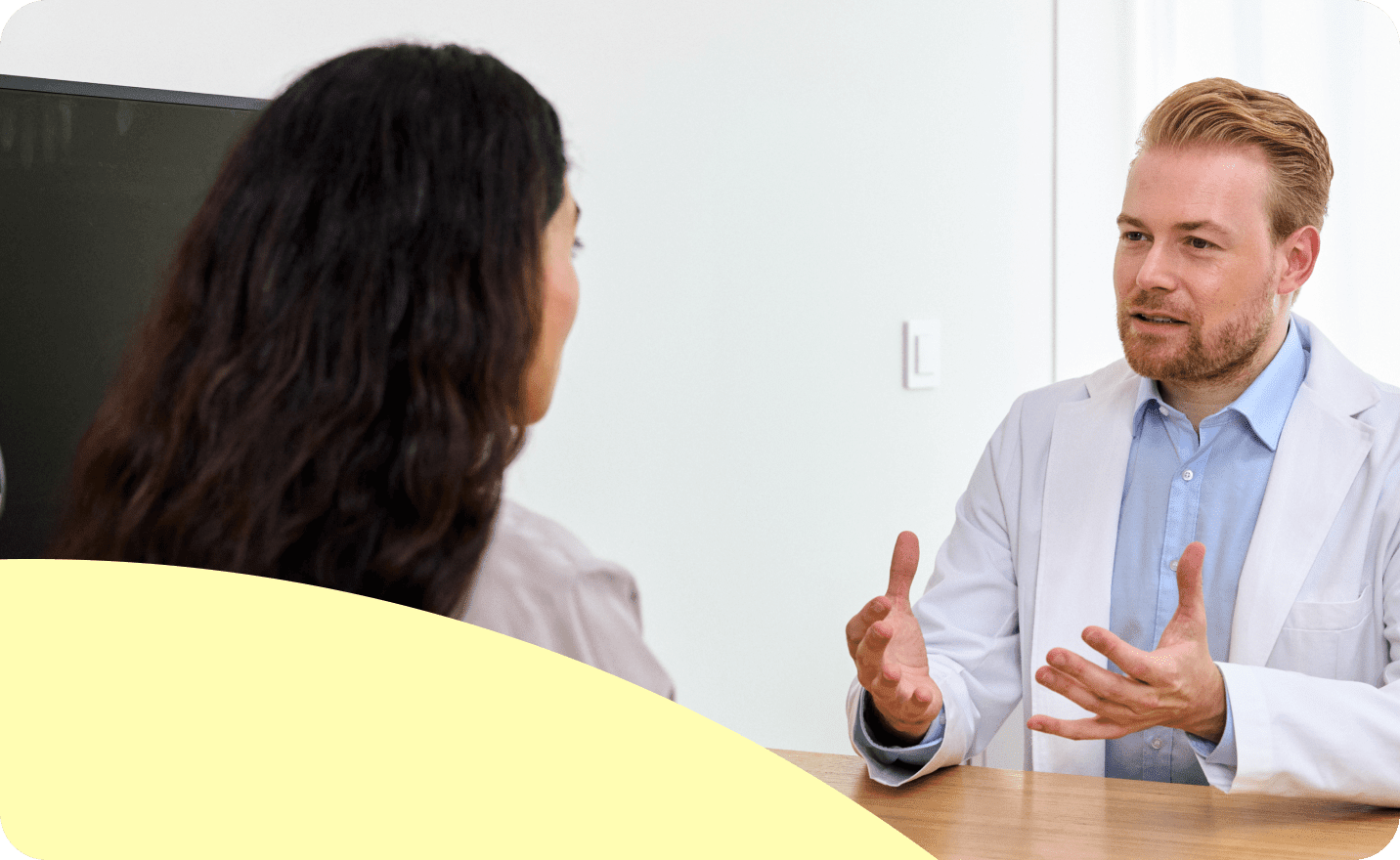Read about what perimenopause is, and how it affects a woman's mind, body, and her fertility.
The years before a woman’s periods stop due to menopause are referred to as perimenopause. During this time, a woman may start to notice a lot of changes in her body and mind, such as hot flashes, trouble sleeping, and mood changes. Perimenopause also affects fertility. Let’s take a closer look.
What is perimenopause?
Perimenopause is the menopausal transition. This is the time during which the frequency of your menstrual periods decline and then finally stop.
This time is characterized by declining ovarian functioning, which results in lower hormone production and less development of ovarian follicles and eggs. The ovaries gradually decrease the levels of estrogen and progesterone they produce and the number of eggs released. A woman’s level of estrogen rises and falls sporadically during perimenopause. This produces a variety of symptoms.
When it has been 12 months since the last period, a woman is considered to have completed the menopausal transition. During menopause, menstruation completely stops and it is no longer possible to become pregnant. For most women, menopause occurs between the ages of 45-55. The median age for menopause in industrialised nations is 50-52 years old.
Before menopause, when periods are just more irregular, it is considered to be perimenopause. Perimenopause usually begins sometime in a woman’s forties but some women can experience premature menopause in their thirties. The median age at which perimenopause begins is 47.5 years.
Women’s healthcare is extremely important during the transition from perimenopause to menopause. The reason why is so important is because the symptoms of perimenopause can cause a variety of health issues, including difficulty sleeping and cholesterol changes. A physician can monitor these changes and provide treatment.
Fertility during perimenopause
In order to become pregnant, the ovaries must release healthy eggs. During perimenopause, the number and quality of eggs decrease. A female is born with all the eggs that she will have throughout her life. With each menstrual cycle, the number of eggs (or ovarian reserve) decreases. The quality of eggs (or the number of chromosomally normal eggs) also decreases over time. Eggs with an abnormal genetic makeup are less likely to implant in the uterus or can more easily result in pregnancy loss. For these reasons, it is more difficult to become pregnant or carry a baby to full term as women get older.
However, you can get pregnant during perimenopause. Until you reach menopause, which is characterized as 12 months without a menstrual cycle, it is still possible to conceive. However, the chances of getting pregnant are very low. In spite of this, you should use birth control if you want to avoid pregnancy.
Symptoms of perimenopause
Some common symptoms that women experience during the menopausal transition include:
- Hot flashes - Hot flashes are common during perimenopause.
- Night sweats - Drenching night sweats are common during peri- and post-menopause.
- Sleep problems - Sleep problems may be due to hot flashes or night sweats or they may be common even without these issues.
- Vaginal dryness - Vaginal itching, dryness and other symptoms may occur during perimenopause. Vaginal lubricants, as well as topical estrogen cream, can help with these problems.
- Bladder problems - There is an increased risk of urinary tract infections and other bladder problems during perimenopause.
- Mood swings - Depression and other mental health changes can occur during this time.
- Changes in sexual functioning - Evidence suggests that sexual functioning and desire decrease during the menopausal transition.
- Fertility problems - As a woman's periods become more irregular, fertility decreases.
- Cholesterol changes - Good cholesterol or HDL may decrease in women as they age. “Bad” cholesterol, or low-density lipoprotein (LDL) cholesterol may increase, leading to an increased risk of heart disease.
- Weight gain - Many women gain weight as they enter perimenopause.
- Irregular periods - Hormonal changes lead to irregular periods during this time.
Menopausal symptoms may vary during this time as hormone levels fluctuate greatly. Some women choose to do hormone therapy during this time to manage symptoms. Many women find that low-dose birth control helps many of the symptoms. Progesterone may be given as well. Antidepressants may help with some of the symptoms. But, this is something that should be discussed with your gynecologist.
Health conditions associated with perimenopause
There are several health conditions that are associated with perimenopause.
- Uterine fibroids - When women enter perimenopause, there will be sudden changes in hormones in the body. This causes estrogen levels to be disrupted and can cause fibroids to form.
- Mental health concerns - Depression and mood swings may increase around perimenopause due to fluctuating estrogen levels.
- Endometriosis - Perimenopause can cause worsening of endometriosis because it is associated with estrogen levels.
Strategies to address perimenopause symptoms
Hormonal treatments
Your gynecologist may recommend hormonal treatments for perimenopause.
Systemic hormone therapy - This type of hormonal therapy comes in a skin patch, pill, cream, or gel. It is the most effective treatment for night sweats and hot flashes.
Vaginal estrogen - This cream is administered directly to the vagina and can help relieve vaginal discomfort and dryness, as well as some urinary symptoms.
Lifestyle changes
Lifestyle changes can be helpful, as well. Here are some lifestyle changes that your healthcare provider or gynecologist may suggest:
- Stay active and exercise on a regular basis
- Eat a healthy diet that is high in whole vegatables and fruits
- Avoid things that trigger your hot flashes such as drinking alcohol
- Supplement with calcium to keep your bones strong
What is the difference between perimenopause, early menopause and premature menopause?
Both early menopause and premature menopause describe conditions where a person may go through menopause early.The difference is the timeline. Early menopause occurs before the age of 45 while premature menopause occurs before the age of 40. Early menopause occurs in about five percent of women. Premature menopause affects approximately 1 percent of women under the age of 40.
What causes premature and early menopause?
Anything that stops estrogen production or damages your ovaries can cause early menopause. Common causes of early menopause include:
- Surgery to remove the ovaries (oophorectomy).
- Breast cancer treatments such as chemotherapy or radiation.
- Hysterectomy or surgery to remove the uterus.
- Smoking cigarettes.
- Getting your first period before age 11.
- Family history of menopause at an early age.
- Autoimmune diseases like rheumatoid arthritis, Crohn’s disease or thyroid disease.
- Infections such as mumps
- Having HIV or AIDS.
- Myalgic encephalomyelitis/chronic fatigue syndrome (ME/CFS).
- Chromosomal abnormalities like Fragile X or Turner’s syndrome.
How to know if you are still ovulating
The best way to tell whether you are still ovulating or not is to visit a physician or fertility specialist. Some signs that you may also use to inform yourself include:
- Changes in your cervical mucus—Around the time of ovulation, your mucus changes. It becomes clearer. It also becomes stretchy and slippery, like a raw egg white. If you notice this, then that means that there is still an egg waiting to be fertilized. As you transition to perimenopause, you might notice that your cervical mucus is like this for a shorter amount of time. This means that you are fertile for a shorter amount of time.
- Increase in basal body temperature—During ovulation, your basal body temperature rises slightly. Tracking this requires that you take your temperature every morning.
- Increased libido—It’s common to experience an increase in sexual desire two to three days before you are most fertile.
- Ovulation pain—Ovulation pain is a sharp pain in your lower abdomen that may occur mid-cycle.
- Breast tenderness—You may experience breast pain and tenderness when you are ovulating.
How can I increase the chance of getting pregnant during perimenopause?
If you and your partner want to get pregnant, there are various things that you can do to try to improve your fertility. If you are in early menopause or perimenopause, it is a good idea to start with fertility testing.There are many tests that can be used to measure fertility.
Ovulation testing
A blood test is used to measure hormones to determine whether or not you are ovulating.
Home ovulation tests
These tests can be done at home. They detect a rise in luteinizing hormone (LH) in the urine. A rise in this hormone signals to the ovary that it’s time to release an egg, which is when pregnancy is most likely to occur. These kits can be purchased online or at most drugstores.
Ovarian reserve testing
Ovarian reserve testing measures how many eggs a person has. It uses a combination of blood tests, such as the Anti-Müllerian hormone (AMH) level, along with vaginal ultrasound to help evaluate the number of eggs that remain. Hormone testing is often done early in the menstrual cycle.
Other Hormone Testing
Other hormone tests are used to check levels of ovulatory hormones, as well as follicle-stimulating hormone (FSH) and other reproductive pituitary hormones.
The risks of conceiving after the age of 40
Age increases the risk of infertility because egg quality declines. In women over 40, the risk of complications increases. There is an increased risk of:
- Preeclampsia - A serious disorder that can occur during pregnancy. It results in high blood pressure.
- High blood pressure
- Gestational diabetes
- Premature birth
- Birth abnormalities or genetic abnormalities
- Getting pregnant with multiples
Fertility treatment options
There are a variety of fertility treatment options for women who are older than 35 and wish to conceive:
In vitro fertilisation (IVF)
This is a series of procedures to help with fertility and conception of a child. During IVF, eggs are collected from the ovaries and fertilized by sperm in a lab. The fertilized eggs are then transferred to the uterus. IVF is the most effective form of assisted reproductive technology.
Intrauterine insemination (IUI)
Intrauterine insemination (IUI) is a type of artificial insemination that can be used to treat infertility. Sperm are washed and concentrated and put in the uterus around the time that your ovary releases eggs to be fertilized.
Surrogacy and donor eggs
In Switzerland, surrogacy and the use of donor eggs is prohibited by law. In principle, however, these are options that make pregnancy possible for women who might not be able to use their own eggs or carry a child.
Women going through early menopause or primary ovarian insufficiency (POI) may choose to use donor eggs to get pregnant. Gestational surrogacy is when a person carries and gives birth to a baby for another person or couple. This procedure is usually done via in vitro fertilisation (IVF).
Social egg freezing
Social egg freezing refers to the stimulation, extraction, and freezing of a woman’s egg cells in order to have a pregnancy later in her life. It is typically offered to women under the age of 38. This allows women who want to conceive during perimenopause the chance to do so.
FAQ
Is POI (Primary Ovarian Insufficiency) the same as early menopause?
No, primary ovarian insufficiency occurs when a woman’s ovaries stop working before she is 40 years of age. The ovaries don’t produce the typical amounts of estrogen or release eggs regularly. This often leads to infertility. However, unlike early menopause, with POI, a woman may still be able to get pregnant. With POI, some women still have occasional periods.
When should I seek medical advice?
Women who are going through perimenopause or early menopause should talk to their physician or gynecologist if they wish to become pregnant.
Takeaway
Early menopause, premature menopause and perimenopause can all affect fertility. If you want to become pregnant, and you have symptoms of perimenopause, then it’s best to talk to your women’s health doctor about fertility testing and treatment options. Reserve your spot for a personalised consultation today.







